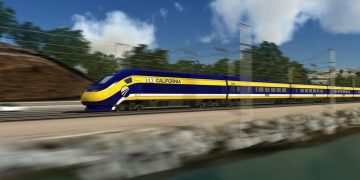California rail authority announces $1.4B cost increase, COVID-19-induced delays : In an update to its 2020 Business Plan, which the California High-Speed Rail Authority (CHSRA) plans to officially release Feb. 9, the authority will report that costs for the Central Valley line (Merced to Bakersfield) have increased to $13.8 billion from $12.4 billion. This amount includes $330 million of extra construction costs and a $1 billion enhanced risk contingency.
CHSRA CEO Bryan Kelly wrote in a letter accompanying the updated plan that the COVID-19 pandemic has affected the schedule as well as costs. The primary 22-mile segment will not be ready for another 15 months, putting completion at about May 2022. Completion of the remaining construction packages is not expected until 2023.
Kelly also wrote that the authority has been in touch with the Biden administration about these delays and extra costs and believes that they can work together. This includes a potential restoration of a federal investment in the project, which the Trump administration pulled.
- California bullet train contractor Tutor Perini has taken the California High-Speed Rail Authority to task in a 36-page letter, calling its failure to obtain the necessary rights of way after more than seven years since obtaining approval for the project “beyond comprehension” and indicating that the $20 billion, 23-mile Central Valley segment might not meet a November 2022 funding deadline, the Los Angeles Times reported.
- Because of the CHSRA’s failure to obtain the necessary land, Ghassan Ariqat, Tutor Perini’s vice president of operations, wrote that construction is stalled on 500 parcels and that layoffs are on the way. The company, which leads a design-build team that also includes Zachry Construction and Parsons, wrote that it has slowed its pace of work and that, currently, it is building only 50% of what it needs to complete the project on time.
- Ariqat also cited the authority’s staff turnover and the inability of the state to reach agreements with utilities and freight railroads as additional drags.
Brian Kelly, the authority’s CEO, disputed Tutor Perini’s claims to the Times and said that the letter was an attempt to blame project difficulties on “everybody else,” but that it would review the general contractor’s claims. Another CHSRA official told the Times that jobs had actually been created during the last 18 months and that they expected that growth to continue.
Despite the accusations, things could be looking up for the beleaguered rail project now that President Joe Biden, an advocate of rail travel, has been sworn in. The relationship between the former administration and the state of California in regard to the rail initiative was contentious, with President Donald Trump putting the CHSRA on notice that it intended to cancel a $929 million Federal Railroad Administration grant, and would seek to claw back $2.5 billion in other federal money the project has received.
The Biden administration might also ease up on the November 2022 completion milestone deadline, which the letter from Tutor Perini said would likely not be met until at least November 2023.
While not on the scale of the bullet train, which could end up costing $100 billion if the state decides to deliver the original Northern to Southern California route, the Colorado Interstate 70 project through Denver reportedly has also run into some problems and cost overruns, according to The Gazette.
The $1.2 billion Central 70 project will see the reconstruction of a 10-mile highway segment of I-70 in Denver as well as new express lanes. Kiewit Meridiam Partners is the design-build contractor.
During a recent meeting of the state legislature’s joint budget committee, Colorado DOT officials told lawmakers that the project could end up costing as much as $150 million, mostly due to necessary changes in the design so that the work can successfully navigate around existing railways and railroad bridges. The project is also estimated to take about 10 months longer than originally anticipated. The expansion is now scheduled for completion in April 2024 instead of June 2023.
The project has forced a discussion among elected officials and other leaders about whether the design-build method creates more risk and could end up costing Colorado taxpayers too much money, The Gazette reported.
Construct America Magazine | The Home of Construction Industry News





















